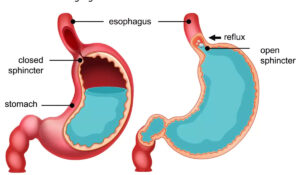
Around the world, millions of individuals suffer with acid reflux, a common digestive problem. Most people get heartburn occasionally, but chronic acid reflux, or GERD (Gastroesophageal Reflux Disease), can seriously lower your quality of life. You can effectively manage acid reflux by understanding the symptoms, typical triggers, and lifestyle modifications discussed in this article. If you’re looking for expert advice, consulting one of the top 10 gastroenterologists in Surat can provide tailored guidance for your specific condition.
Acid reflux: What Is It?
Acid reflux occurs when stomach acid flows back into the esophagus, the tube connecting your throat to your stomach. This backward movement can irritate the lining of your esophagus, causing a variety of symptoms ranging from minor discomfort to severe agony.
Symptoms of Acid Reflux
Recognizing the symptoms of acid reflux is the first step toward managing it. Common signs include:
- Heartburn A burning sensation in the chest, often after eating or when lying down.
- Regurgitation A sour or bitter taste in your mouth caused by acid rising up.
- Difficulty Swallowing Also known as dysphagia, this can occur if the esophagus becomes narrowed.
- Chronic Cough or Sore Throat These symptoms are often mistaken for a respiratory issue but can be caused by acid irritation.
- Hoarseness Acid can harm your vocal cords and cause changes in your voice.
- Bloating and Nausea Some people experience stomach discomfort or a sense of fullness after eating.
If you’re experiencing persistent or severe symptoms, it’s crucial to consult a trusted gastroenterologist in Surat for accurate diagnosis and treatment.
Common Triggers of Acid Reflux
Understanding what triggers your acid reflux can help you take preventive measures. Here are some common culprits:
1. Foods and Beverages
Certain items are known to relax the lower esophageal sphincter (LES), the muscle that keeps stomach acid from flowing backward. Common offenders include:
- Spicy foods
- Fatty or fried foods
- Citrus fruits and juices
- Tomatoes and tomato-based products
- Caffeine and alcohol
- Carbonated beverages
2. Overeating
Eating large meals can put pressure on the stomach, forcing acid to escape into the esophagus.
3. Lying Down After Eating
Reclining soon after a meal can increase the likelihood of acid reflux.
4. Smoking
Tobacco weakens the LES and increases stomach acid production, making reflux more likely.
5. Obesity
Excess weight can put pressure on the stomach, exacerbating reflux symptoms.
6. Stress
While stress doesn’t directly cause acid reflux, it can worsen symptoms by increasing sensitivity to acid.
Lifestyle Changes to Manage Acid Reflux
The good news is that acid reflux can often be managed effectively with some lifestyle adjustments. Here are some strategies:
1. Dietary Modifications
- Eat Smaller Meals: Instead of three large meals, opt for five or six smaller ones throughout the day.
- Avoid Trigger Foods: Identify and eliminate foods that worsen your symptoms.
- Stay Hydrated: Drink plenty of water, but avoid large amounts during meals.
2. Maintain a Healthy Weight
Losing even a small amount of weight can significantly reduce symptoms in overweight individuals.
3. Adjust Your Sleeping Position
- Elevate Your Head: Use a wedge pillow or elevate the head of your bed by 6-8 inches.
- Sleep on Your Left Side: This position reduces the chance of acid traveling upward.
4. Avoid Eating Late at Night
Give your stomach at least 2-3 hours to digest food before lying down.
5. Quit Smoking
Eliminating tobacco use can improve LES function and reduce acid reflux episodes.
6. Manage Stress
- Relaxation Techniques: Try yoga, meditation, or deep breathing exercises.
- Physical Activity: Regular exercise can improve digestion and reduce stress.
7. Limit Alcohol and Caffeine
Cut back on these beverages to prevent LES relaxation and acid production.
When to Seek Medical Help
While lifestyle changes can be incredibly effective, some cases of acid reflux require medical intervention.
- If you experience symptoms more than twice a week
- If over-the-counter antacids don’t provide relief
- If you have difficulty swallowing or unexplained weight loss
In such cases, a gastroenterologist can recommend treatments like prescription medications or even surgical options if necessary.
Treatment Options
1. Medications
- Antacids: Neutralize stomach acid for quick relief.
- H2 Blockers: Reduce acid production (e.g., ranitidine, famotidine).
- Proton Pump Inhibitors (PPIs): Offer long-term relief by blocking acid production (e.g., omeprazole, esomeprazole).
2. Endoscopic Procedures
For severe cases, minimally invasive techniques can help strengthen the LES.
3. Surgery
In extreme cases, procedures like fundoplication are used to reinforce the LES.
Final Thoughts
Acid reflux is more than just an inconvenience—it can significantly affect your daily life if left unmanaged. The good news is that by identifying your triggers and adopting a proactive approach, you can keep symptoms under control. If lifestyle changes don’t provide relief, consulting one of the top 10 gastroenterologists in Surat can help you explore more advanced treatment options.
By staying informed and making thoughtful adjustments, you can take control of your digestive health and enjoy a more comfortable life.
